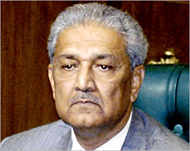Pakistan frees nuclear scientist
A senior Pakistani nuclear scientist who was arrested in late 2003 for allegedly leaking sensitive technology to foreign countries, has been freed.

Mohammed Farooq was released last week, Pakistan’s army spokesman said on Sunday.
“He has been released and allowed to go home,” Major-General Shaukat said.
Farooq, who worked at Pakistan‘s top nuclear weapons facility, Khan Research Laboratories, was detained in December 2003, along with 10 other people.
His arrest coincided with revelations that the head of the facility, Abdul Qadeer Khan, had given sensitive technology to Iran, Libya and North Korea.
Farooq, who was director-general at the laboratories, was suspected of allegedly leaking technology on Khan’s orders.
Father of bomb
Khan, the so-called father of Pakistan‘s atomic bomb programme, has been under house arrest since 2004.
Several of his collaborators in Europe have been arrested in Germany, Switzerland and South Africa.
 |
|
Abdul Qadeer Khan admitted |
The UN nuclear watchdog, the International Atomic Energy Agency (IAEA), suspects that Iran obtained gas centrifuges, which are used to enrich uranium, through the Khan network.
Asked whether Farooq had been fired or would keep his job at the laboratories, the army spokesman said: “He has been advised to restrict his movement and activities and stay at home for security reasons.”
Sultan would not say whether Farooq had been found guilty of any wrongdoing or discuss any details about the scientist’s investigation.
Farooq was the last man who remained in detention.
He was among 11 people – scientists, security and administration officials – who worked at the lab and were detained in 2003 for questioning over the spread of nuclear technology in an alleged black market network ran by Khan.
There was no immediate comment available from Farooq or his family.
Secrets sold
The other nuclear officials have avoided speaking with the media or discussing their detention publicly after their release.
In February 2004, Khan confessed that he sold nuclear secrets to Iran, North Korea and Libya.
But Pakistan’s president, General Pervez Musharraf, pardoned Khan for granting Pakistan, a conservative Islamic country, its nuclear prowess to rival that of arch-rival India.
|
“He’s been released … (and) advised to restrict his movement and activities and stay at home for security reasons” Pakistan’s army spokesman, Major-General Shaukat |
The neighbours, who have already fought three wars, carried out nuclear tests in 1998.
Pakistan, a close US ally in the so-called war against terrorism, has rejected Washington requests to question Khan over his role in nuclear black marketing.
In January 2006, UK’s Guardian newspaper said a European intelligence report had detailed how Pakistan, Syria, Iran and North Korea were successfully infiltrating Western European engineering firms, germ laboratories, scientific think-tanks and university campuses to steal nuclear secrets and buy equipment.
Espionage
Spying on nuclear-capable countries is apparently how Khan managed to develop Pakistan’s nuclear programme.
Holland, where Khan studied and worked as young man, found that he had passed highly classified material to a network of Pakistani intelligence agents in the mid-1970s.
Twenty years later, the former Dutch prime minister, Ruud Lubbers, revealed in August 2005 that his country had let Khan go on two occasions after the CIA expressed their wish to continue monitoring his movements.